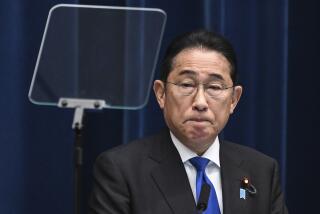After Takeshita’s Fall: U.S. Specialists Don’t Expect Major Changes
- Share via
WASHINGTON — The fall of Prime Minister Noboru Takeshita is expected to turn inward the focus of Japanese politics, slowing the pace of decision-making on U.S.-Japan relations and foreign policy as a whole, American officials and academic experts said Tuesday.
However, U.S. specialists said they do not expect major changes in direction, because there is no opposition party or group of parties capable of shaking the Liberal Democratic Party’s 34-year hold on power.
“Our relations with the government of Japan remain unchanged,” State Department spokeswoman Margaret Tutwiler said. “Japan is a close ally.”
However, the United States and Japan, as the world’s two greatest economic powers, have natural economic rivalries that constantly threaten to pull apart their political alliance, which has become a foundation of the foreign policy of both countries.
These frictions often are exploited in Congress and within the bureaucracies of Japan’s Cabinet-level ministries by forces seeking to gain an advantage over the other country.
Under normal conditions, the U.S. President and the Japanese prime minister strive to smooth out the natural friction. But with Japan facing a government crisis, the balance is upset.
“For awhile there will be an almost complete concentration on domestic affairs” in Japan, said Nathaniel B. Thayer, director of Asian studies at Johns Hopkins University’s School of Advanced International Studies. “The ministries will take over, and that’s not a good sign. Each ministry has its own domestic constitutents. Without a strong prime minister, there is no one to consider the overall national interest.
“You can expect a slowdown of an already slow process of resolving U.S.-Japan relations,” he added.
Tutwiler agreed that Takeshita’s resignation will have an effect on the pace of U.S.-Japan decision-making, but she insisted that it will bring no change in “the character of our relationship with our close ally Japan.”
In a sense, the inward turn already has taken place. Takeshita, battling the daily revelations of the Recruit Co. influence-buying scandal and facing a ruinous dive in his popularity, has been concentrating on domestic politics for months.
Takeshita had reduced sharply his contacts with U.S. government officials and other foreign leaders to concentrate on his unsuccessful fight to retain the prime ministership, according to a well-placed source in Washington.
Takeshita, 65, announced Tuesday that he will step down after Parliament completes action on this year’s budget, a process that could take a month or more.
Speculation on a possible successor centers on Masayoshi Ito, chairman of the ruling party’s executive committee. Ito is a former foreign minister who is respected in Washington, but he is 75, old even by the geriatric standards of Japanese politics, and ailing with diabetes.
Caretaker Role
If picked to replace Takeshita, he may serve only in a caretaker capacity while the party seeks a politician with more stamina. However, as an interim leader, Ito would lack the political clout to put his policies into practice.
“The good part of it is he has been foreign minister,” Thayer said. “He did very well as foreign minister. He stands up very firmly for the U.S.-Japan alliance. From our standpoint he will do fine.”
It may take some time for the feuding factions of the Liberal Democratic Party to select a prime minister because the Recruit scandal has raised serious doubts about the traditional political process.
On Capitol Hill, there was little sympathy for Takeshita’s problems. An aide to one conservative senator remarked: “The fact that they have to find a 75-year-old diabetic (Ito) to step in shows how far down the taint goes.”
However, the ruling party is not required to call fresh elections, so its solid parliamentary majority is in no danger.
Edwin O. Reischauer, 1961-66 ambassador to Japan and director-emeritus of Harvard University’s Reischauer Institute of Japanese Studies, said it is “very improbable” that the fragmented socialist opposition can translate Takeshita’s disgrace into a parliamentary majority.
“I don’t look for any basic changes,” Reischauer said. “In any case, the prime minister is never a determining factor in Japan. He’s not a Margaret Thatcher and certainly not a U.S. President.”
Takeshita’s predecessor, Yasuhiro Nakasone, affected the high-profile style of a British prime minister or an American President. He and then-President Ronald Reagan established a “Ron and Yasu” friendship that personalized the relationship between the two countries.
Takeshita’s relationship with President Bush was far less personal and more institutionalized.
Takeshita is expected to remain a power in Japanese politics despite the scandal. According to some Asia specialists in Washington, he earned the gratitude of other key politicians by accepting responsibility for the scandal and, in effect, easing the pressure on them.
Harald B. Malmgren, a Washington consultant, noted that former Japanese Prime Minister Kakuei Tanaka remained a key political power broker for a decade after he was forced from office as a result of a scandal. He was later convicted of accepting a bribe from Lockheed Aircraft Co.
Times staff writer Don Shannon contributed to this story.
More to Read
Sign up for Essential California
The most important California stories and recommendations in your inbox every morning.
You may occasionally receive promotional content from the Los Angeles Times.













